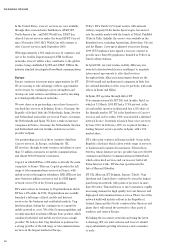BT 1999 Annual Report Download - page 21
Download and view the complete annual report
Please find page 21 of the 1999 BT annual report below. You can navigate through the pages in the report by either clicking on the pages listed below, or by using the keyword search tool below to find specific information within the annual report.
20
required to promote the interests of consumers,
purchasers and other users in the prices, variety and
quality of telecommunication services and equipment,
and to promote and maintain efficiency and effective
competition among the UK telecommunications operators.
With limited exceptions, a licence under the
Telecommunications Act is required to run a
telecommunication system and provide telecommunication
services in the UK. The Secretary of State is responsible
for issuing licences after consulting the Director General.
Any modifications to a licence may be made by the
Director General with the licensee’s consent. Alternatively,
changes to the licence may be referred to the Competition
Commission (CC). In either case, the Telecommunications
Act requires public consultation before a licence
modification may be made. Licences may also be modified
by legislation, including legislation implementing
European Union directives in UK law. The Secretary of
State has recently consulted on proposals to change the
procedures for modifying licences in certain instances.
The BT Licence
BT operates in the UK under a number of licences
granted under the Telecommunications Act, the most
important of which is its public telecommunications
operator licence to operate its fixed-linked public
telecommunication network (the Licence). The Licence
is for a period of 25 years from 5 August 1984 and can be
revoked after ten years’ notice (not to be given before
22 June 1999) and may also be revoked at any time on
various grounds, including non-compliance with its terms.
The Licence contains terms and conditions designed
principally to ensure the provision in the UK of
widespread telecommunication services, to protect the
interests of consumers and to encourage the development
of effective competition in telecommunication services
and equipment within the UK.
The company is required by the Licence to provide,
throughout nearly all of the UK, telecommunication
services, including rural and international services,
which satisfy all reasonable demands to the extent that
it is practicable to provide such services (the universal
service obligation). The company must also make certain
services and facilities available to the public.
The company is required to connect to its
telecommunications system on non-discriminatory
standard terms and conditions any other system run
under a licence which authorises connection to the
company’s system.
The company must comply with a variety of fair trading
obligations, such as a prohibition on showing undue
preference or discrimination in the provision of certain
services or unfairly favouring any part of its own business
as against competitors; a prohibition on the unfair cross-
subsidy of certain activities of the company; and a general
prohibition on anti-competitive acts or omissions, in
particular, agreements or concerted practices which may
prevent, restrict or distort competition and any abuse of a
dominant position.
The Licence contains price control formulae, the overall
effect of which requires the company to reduce, or
restricts the extent to which it can increase, the prices
of many of its telephony services to the bulk of the
residential market. In addition, the Licence contains
certain specific restrictions on the terms on which BT
can trade. In particular, the company is required to
publish and adhere to standard prices and other terms
for providing certain services and, in general, to apply
uniformly a published scale of charges for installing
residential exchange lines on premises to be served
by a single line.
The Licence also contains provisions enabling the
Director General to monitor the company’s activities,
including requirements for BT to supply him with
information he requests and to maintain segregated
accounting records for specified parts of its business.
Where it appears to the Director General that an unfair
cross-subsidy exists in relation to specified parts of its
business, BT must take such steps as the Director
General may direct to remedy the situation.
UK telecommunications licences, including the BT
Licence, are currently being amended to meet the
harmonisation requirements of the European Union
Licensing Directive.
Competition and regulation
The UK telecommunications market is fully open to entry
and is highly competitive. As a result, HM Government
and Oftel have indicated their expectation that it will be
appropriate to move away from specific licence-based
regulation to greater reliance on the increased powers
under the Competition Act 1998, which comes into effect
in March 2000 (see Future regulation below).
However, as described above, Oftel currently regulates
BT mainly through the provisions in the Licence.
Although it is some years since the Telecommunications
Act 1984 abolished the monopoly in telecommunications,
obligations placed on BT are generally more onerous than
for other licensees.
BUSINESS REVIEW
























